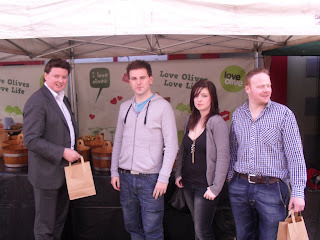In addition, he said many constituents had voiced “frustration” with the Alliance Party - “in particular Anna Lo’s declaration during the European election that she’s in favour of a united Ireland.”
Asked what result he would consider a disappointment or failure, he said: “I’m not considering a failure or a disappointment, but am actively campaigning to attract and increase my share of the vote, in the hope that others who have been losing ground may lose enough to enable me to succeed.”
Meanwhile, Sammy Wilson said at the heart of his campaign was the idea that a DUP win will add to its existing Westminster team - saying the DUP is the only party able to send a large team to Westminster.
Its first election in 1983 returned UUP man Roy Beggs Senior with 37.4 per cent of the vote.
The contest was narrow — Jim Allister (then with the DUP) polled 36.4 per cent.
But the UUP remained the dominant force until 2005, when the DUP soared ahead with 49.6 per cent of the vote, against the UUP’s 26.6 per cent.
Sammy Wilson has remained MP ever since, winning 45.9 per cent in 2010.
Challenging him is the UUP’s Roy Beggs Junior — son of the original seat-winner, and an MLA since 1998.
He is standing as an MP for the first time.
Asked what the main issues are, he was keen to highlight Mr Wilson’s long-time “double-jobbing” (that is, holding seats as both an MLA and a Westminster MP simultaneously).
He also claimed credit for helping secure funding for work on the A2 and the A8 arterial roads during his tenure as finance minister.
He refused to put a target on what share of the vote he expects.
As to “double-jobbing”, he said: “I think he [Beggs] is one of the candidates who has the least cause to talk about double-jobbing... He’s also a farmer as well as an MLA. At least my jobs are complementary to each other.”
Data from the 2011 census shows that only 20.4 per cent of the constituency is Catholic (or were raised Catholic), and a mere 10.5 per cent said “Irish” formed part of the national identity.
With figures like these, it is clear the unionist hue of East Antrim will not change any time soon. Despite this, it may be imprudent to ignore the Alliance Party.
It enjoys a significant minority of votes, ranging between roughly 10 and 20 per cent in Assembly and General Elections since 1997.
Source : http://www.newsletter.co.uk/news/ni-politics/election-2015-east-antrim-1-6720213
Asked what result he would consider a disappointment or failure, he said: “I’m not considering a failure or a disappointment, but am actively campaigning to attract and increase my share of the vote, in the hope that others who have been losing ground may lose enough to enable me to succeed.”
Meanwhile, Sammy Wilson said at the heart of his campaign was the idea that a DUP win will add to its existing Westminster team - saying the DUP is the only party able to send a large team to Westminster.
Its first election in 1983 returned UUP man Roy Beggs Senior with 37.4 per cent of the vote.
The contest was narrow — Jim Allister (then with the DUP) polled 36.4 per cent.
But the UUP remained the dominant force until 2005, when the DUP soared ahead with 49.6 per cent of the vote, against the UUP’s 26.6 per cent.
Sammy Wilson has remained MP ever since, winning 45.9 per cent in 2010.
Challenging him is the UUP’s Roy Beggs Junior — son of the original seat-winner, and an MLA since 1998.
He is standing as an MP for the first time.
Asked what the main issues are, he was keen to highlight Mr Wilson’s long-time “double-jobbing” (that is, holding seats as both an MLA and a Westminster MP simultaneously).
He also claimed credit for helping secure funding for work on the A2 and the A8 arterial roads during his tenure as finance minister.
He refused to put a target on what share of the vote he expects.
As to “double-jobbing”, he said: “I think he [Beggs] is one of the candidates who has the least cause to talk about double-jobbing... He’s also a farmer as well as an MLA. At least my jobs are complementary to each other.”
Data from the 2011 census shows that only 20.4 per cent of the constituency is Catholic (or were raised Catholic), and a mere 10.5 per cent said “Irish” formed part of the national identity.
With figures like these, it is clear the unionist hue of East Antrim will not change any time soon. Despite this, it may be imprudent to ignore the Alliance Party.
It enjoys a significant minority of votes, ranging between roughly 10 and 20 per cent in Assembly and General Elections since 1997.
Source : http://www.newsletter.co.uk/news/ni-politics/election-2015-east-antrim-1-6720213




